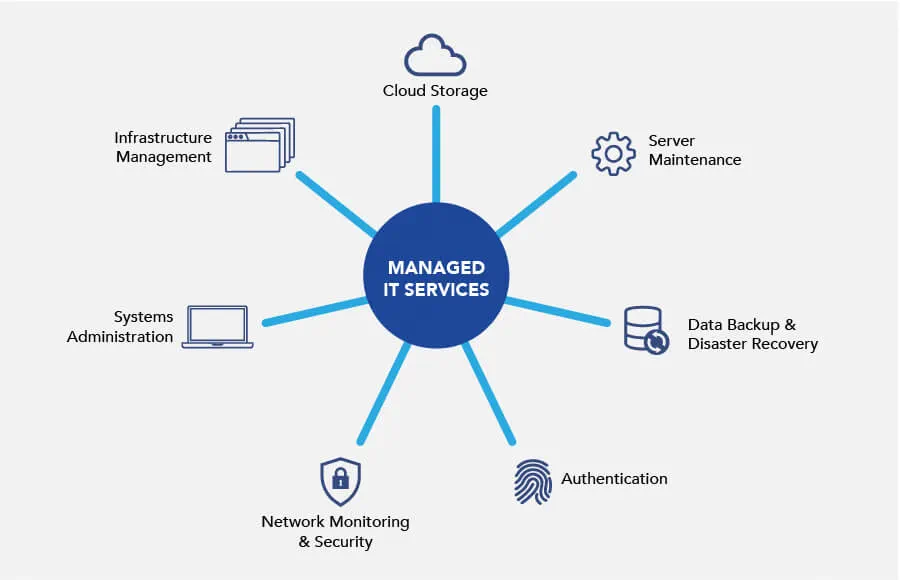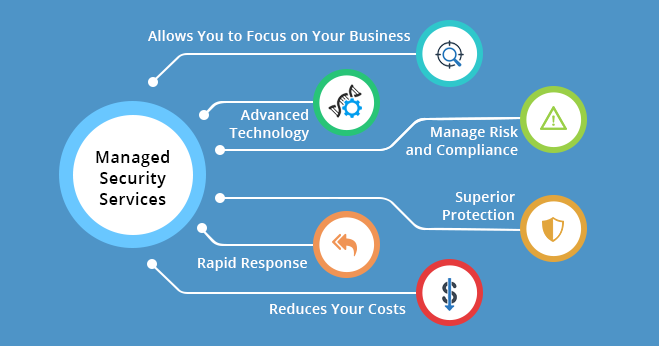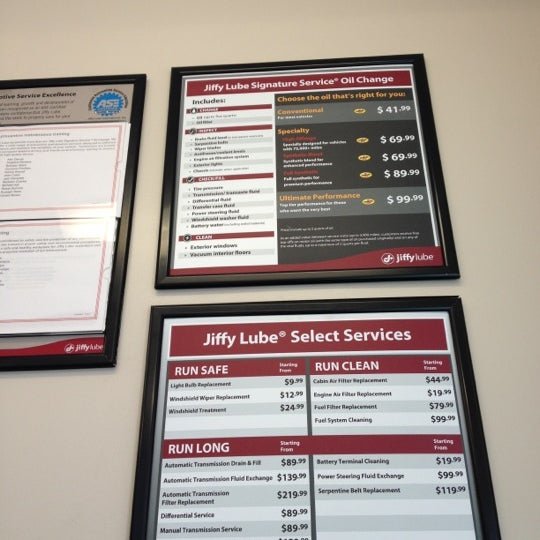Businesses are going digital in every way possible and in today’s fast-paced digital world, it goes without a doubt that IT and technology are the backbones of every successful business.
From customer management to data storage, having cutting-edge technology is important for streamlining operations and improving efficiency.
For organizations, especially those without specialized IT staff, monitoring and maintaining technology may be a difficult task, but a managed IT services provider can help with that. You can concentrate on what you do best—running your business—by outsourcing your technical requirements to a team of professionals.
We’ll discuss the significance of managed IT services and how they may help your company in a variety of ways in this blog. So continue reading if you’re ready to grow your company.
What are Managed IT services?

People working in an IT company cannot always be burdened with the task of managing IT services – if they do so, they will not be able to focus on the core areas of the business. Which is why they need managed IT services.
Managed IT services are outsourcing IT services to a third-party provider, who takes responsibility for managing and maintaining an organization’s IT systems and infrastructure. This can include managing both hardware and software, data scraping tools monitoring systems, backing up data and updating, providing security measures, and resolving technical issues.
The MSP performs the duties of a professional IT department, except that they are not physically present in your office and instead manage the technological infrastructure of a firm. Organizations can free up internal resources, concentrate on their core business operations, and gain access to IT professionals’ experience without having to hire them by outsourcing their IT services.
The MSPs can be hired for the necessary hours or retained as extended members of the team, depending on the specific needs of the organization. Basic maintenance and monitoring are just the beginning; more involved activities like network design and implementation, data backup and disaster recovery, and cloud computing solutions are also available.
How do managed IT services work?
Managed IT services are provided by an outsourced team, in which a company contracts with a Managed Service Provider (MSP) to manage and maintain its software and IT infrastructure.
The MSPs begin their procedure with an evaluation in which they review the organization’s current IT infrastructure, look for potential problems, and specify areas that need improvement. The MSP and the organization then develop a service agreement detailing the precise services requested, the amount of assistance necessary, and the conditions of the agreement.
Next, the MSP deploys the necessary hardware, software, and resources needed to support the organization’s IT infrastructure. This may involve installing and configuring new hardware or software, migrating data, and implementing security measures. The MSP provides ongoing monitoring and maintenance of the organization’s IT systems, ensuring they function optimally and addressing any issues that arise promptly. The MSPs also provide help desk support to the organization’s employees, resolving technical issues and answering any questions they may have.
The MSP reports to the organization on the status of their IT infrastructure, and issues or concerns that need attention. Organizations can gain from increased productivity, decreased downtime, improved security, access to the newest technology, and expertise by outsourcing IT infrastructure management and support to an MSP without having to invest in an internal IT department. Organizations may concentrate on their core business operations while having peace of mind that their IT infrastructure and systems are in competent hands by signing a service agreement with an MSP.
Benefits of Managed IT Services for Your Business
infrastructure to guarantee optimal availability, reducing the chance of downtime and the costs involved.
Improved Security
MSPs may put the newest security controls in place to safeguard an organization’s IT systems and data from online attacks, lowering the chance of data breaches and other security issues.
Access to Expertise
MSPs employ IT specialists with specific knowledge and experience who may offer suggestions, support, and leadership on technological matters.
Scalability
Managed IT services may adapt to the demands of a business, making it simple for them to add or remove services as needed without having to make a sizable investment
Cost Savings
Outsourcing IT services to an MSP can be more cost-effective than maintaining an in-house IT department, allowing organizations to reduce their IT infrastructure costs while still benefiting from expert support.
Improved Productivity
By outsourcing IT management and support to an MSP, organizations can focus on their core business activities, improving overall productivity and efficiency.
24/7 Support
Many MSPs offer 24/7 support, providing prompt assistance and resolving issues outside of regular business hours.
What to know before hiring an MSP?
Hiring an MSP can be a daunting task but to make the right decision, there are a few things you should consider.
Define Your IT Needs
Before starting any project, specify the services you need and establish your IT requirements. This will assist you in locating MSPs who have expertise in the areas you seek and can satisfy your particular needs.
Check their Experience and Expertise
Go for out managed IT services providers who have a history of providing high-impact services. They should have knowledge of handling your IT requirements and experience working with businesses in your sector.
Examine Certifications and Partnerships
Seek out MSPs having partnerships with top technology vendors and certifications that are acknowledged in the market. This shows that they are informed about the most recent technologies and best practices.
Review Service Level Agreements (SLAs)
MSPs should offer detailed SLAs that outline the services they will offer, the anticipated response times, and the corrective actions that will be taken if they fail to live up to their promises.
Review Security Measures
To safeguard your data and systems from online dangers, MSPs should have strong security measures in place. Seek out MSPs who have security-related certifications like SOC 2, ISO 27001, or other certifications.
Get references:
Getting references will enable you to evaluate their professionalism, responsiveness, and level of service quality.
Assess Support Services
Be sure the MSP has a specialized help desk, and a ticketing system, and offers round-the-clock assistance.
Take Home Message
Companies can delegate their necessary or mundane IT tasks to an outside provider of IT services.
SVAM International takes the responsibility for your IT services management and support while guaranteeing rapid process improvement and high productivity. With almost three decades of experience, SVAM International provides the best solutions using a vast array of knowledgeable resources who work from both onshore offices in the US and offshore locations in Mexico and India. You can get in touch with them today to know more about the services.




